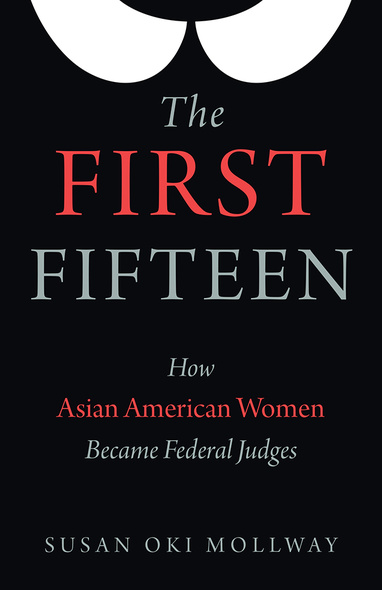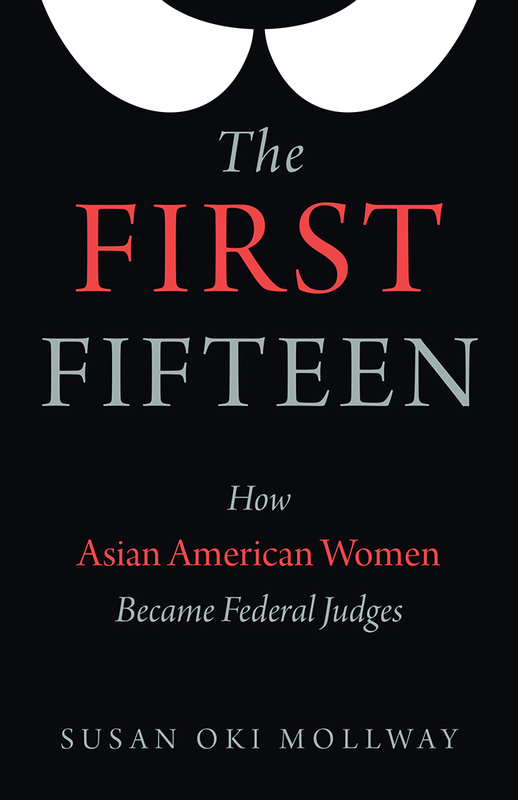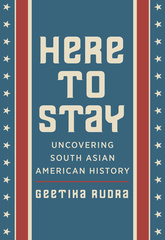
270 pages, 5 1/2 x 8 1/2
14 b-w images
Hardcover
Release Date:30 Sep 2021
ISBN:9781978824515
The First Fifteen
How Asian American Women Became Federal Judges
Rutgers University Press
In 1998, an Asian woman first joined the ranks of federal judges with lifetime appointments. It took ten years for the second Asian woman to be appointed. Since then, however, over a dozen more Asian women have received lifetime federal judicial appointments.
This book tells the stories of the first fifteen. In the process, it recounts remarkable tales of Asian women overcoming adversity and achieving the American dream, despite being the daughters of a Chinese garment worker, Japanese Americans held in internment camps during World War II, Vietnamese refugees, and penniless Indian immigrants. Yet The First Fifteen also explores how far Asian Americans and women still have to go before the federal judiciary reflects America as a whole.
In a candid series of interviews, these judges reflect upon the personal and professional experiences that led them to this distinguished position, as well as the nerve-wracking political process of being nominated and confirmed for an Article III judgeship. By sharing their diverse stories, The First Fifteen paints a nuanced portrait of how Asian American women are beginning to have a voice in determining American justice.
This book tells the stories of the first fifteen. In the process, it recounts remarkable tales of Asian women overcoming adversity and achieving the American dream, despite being the daughters of a Chinese garment worker, Japanese Americans held in internment camps during World War II, Vietnamese refugees, and penniless Indian immigrants. Yet The First Fifteen also explores how far Asian Americans and women still have to go before the federal judiciary reflects America as a whole.
In a candid series of interviews, these judges reflect upon the personal and professional experiences that led them to this distinguished position, as well as the nerve-wracking political process of being nominated and confirmed for an Article III judgeship. By sharing their diverse stories, The First Fifteen paints a nuanced portrait of how Asian American women are beginning to have a voice in determining American justice.
The history and stories captured by Susan Oki Mollway not only preserve an important history of Asian American women in the federal judiciary, but also hopefully encourage more Asian American and other women to put themselves forward for nomination by demystifying the process. The book explores the fascinating back stories of these amazing women beyond their official bios.
At a time when the importance of having federal judges with diverse life experiences and perspectives never has been more apparent, Susan Oki Mollway’s accounting of the paths followed by our nation’s first fifteen Asian American and Pacific Islander women judges is especially illuminating. In granular detail, it describes the attributes, talents and circumstances that enabled each of its subjects to overcome barriers and become a leader in the federal judiciary.’
The First Fifteen shares the powerful narratives of the first Asian American women to become Article III judges, with a focus on their pathways to the federal bench. Through meticulous and thoughtful analysis, Susan Oki Mollway goes far beyond biography to also suggest common background and character traits, reflect on diversity in the judiciary, and recognize the external forces that contributed to their success. The First Fifteen should be required reading for everyone interested in federal courts, issues of diversity, gender studies, and Asian Americans.
Interview: Judge Susan Oki Mollway (’20) on her Duke Law thesis becoming a book
The history and stories captured by Susan Oki Mollway not only preserve an important history of Asian American women in the federal judiciary, but also hopefully encourage more Asian American and other women to put themselves forward for nomination by demystifying the process. The book explores the fascinating back stories of these amazing women beyond their official bios.
At a time when the importance of having federal judges with diverse life experiences and perspectives never has been more apparent, Susan Oki Mollway’s accounting of the paths followed by our nation’s first fifteen Asian American and Pacific Islander women judges is especially illuminating. In granular detail, it describes the attributes, talents and circumstances that enabled each of its subjects to overcome barriers and become a leader in the federal judiciary.’
The First Fifteen shares the powerful narratives of the first Asian American women to become Article III judges, with a focus on their pathways to the federal bench. Through meticulous and thoughtful analysis, Susan Oki Mollway goes far beyond biography to also suggest common background and character traits, reflect on diversity in the judiciary, and recognize the external forces that contributed to their success. The First Fifteen should be required reading for everyone interested in federal courts, issues of diversity, gender studies, and Asian Americans.
Interview: Judge Susan Oki Mollway (’20) on her Duke Law thesis becoming a book
SUSAN OKI MOLLWAY has been a federal judge in the District of Hawaii for over twenty years, serving as the chief judge of the district from 2009 to 2015. Before entering the judiciary, she graduated cum laude from Harvard Law School in Cambridge, Massachusetts, then worked as a civil litigator and later earned an LL.M. from Duke University in Durham, North Carolina.
List of Abbreviations
Introduction
Part One: Context
1. Diversity in the Federal Judiciary
2. Bridging the Gap
Part Two: The Asian Woman Federal Judges
1. Susan Oki Mollway (D. Haw.) (1998)
2. Kiyo A. Matsumoto (E.D.N.Y.) (2008)
3. Jacqueline Hong-Ngoc Nguyen (C.D. Cal.) (2009), (9th Cir.) (2012)
4. Dolly Maizie Gee (C.D. Cal.) (2010)
5. Lucy Haeran Koh (N.D. Cal.) (2010)
6. Leslie Emi Kobayashi (D. Haw.) (2010)
7. Cathy Bissoon (W.D. Pa.) (2011)
8. Miranda Mai Du (D. Nev.) (2012)
9. Lorna Gail Schofield (S.D.N.Y.) (2012)
10. Pamela Ki Mai Chen (E.D.N.Y.) (2013)
11. Indira Talwani (D. Mass.) (2014)
12. Jennifer Choe-Groves (Ct. Int’l Trade) (2016)
13. Karen Gren Scholer (N.D. Tex.) (2018)
14. Jill Aiko Otake (D. Haw.) (2019)
15. Neomi Jehangir Rao (D.C. Cir.) (2019)
16. Continuing Growth
Part Three: Analyzing the Data
1. Timing of Growth
2. Demographic Factors
Acknowledgments
Notes
Bibliography
Index
Introduction
Part One: Context
1. Diversity in the Federal Judiciary
2. Bridging the Gap
Part Two: The Asian Woman Federal Judges
1. Susan Oki Mollway (D. Haw.) (1998)
2. Kiyo A. Matsumoto (E.D.N.Y.) (2008)
3. Jacqueline Hong-Ngoc Nguyen (C.D. Cal.) (2009), (9th Cir.) (2012)
4. Dolly Maizie Gee (C.D. Cal.) (2010)
5. Lucy Haeran Koh (N.D. Cal.) (2010)
6. Leslie Emi Kobayashi (D. Haw.) (2010)
7. Cathy Bissoon (W.D. Pa.) (2011)
8. Miranda Mai Du (D. Nev.) (2012)
9. Lorna Gail Schofield (S.D.N.Y.) (2012)
10. Pamela Ki Mai Chen (E.D.N.Y.) (2013)
11. Indira Talwani (D. Mass.) (2014)
12. Jennifer Choe-Groves (Ct. Int’l Trade) (2016)
13. Karen Gren Scholer (N.D. Tex.) (2018)
14. Jill Aiko Otake (D. Haw.) (2019)
15. Neomi Jehangir Rao (D.C. Cir.) (2019)
16. Continuing Growth
Part Three: Analyzing the Data
1. Timing of Growth
2. Demographic Factors
A. Particular Asian Ethnicities
B. Immigrant or Child of Immigrant
C. Geography
D. Age
E. Family Structure and Parents’ Varied Professions
F. Political Affiliation
G. Type of Career
H. Summarizing the Demographic Characteristics
3. Attitudinal Factors B. Immigrant or Child of Immigrant
C. Geography
D. Age
E. Family Structure and Parents’ Varied Professions
F. Political Affiliation
G. Type of Career
H. Summarizing the Demographic Characteristics
A. Reliance on Encouragement
B. Indefatigable Nature
4. Why Aren’t These Other Asian Women Article III Judges? B. Indefatigable Nature
A. Women Who Opted Not To Apply
B. Women Who Applied But Were Not Nominated
Conclusion B. Women Who Applied But Were Not Nominated
Acknowledgments
Notes
Bibliography
Index





